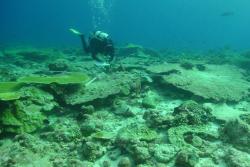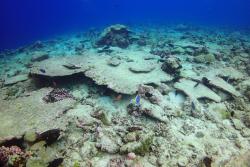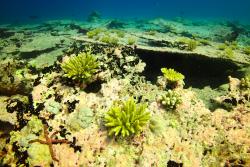Back-to-back heatwaves kill more than two-thirds of coral
 The aftermath of back to back warming events on coral reefs in the British Indian Ocean Territory with an estimated 70% dead coral : All images- credit J.TurnerStudy shows severe loss of central Indian Ocean coral reefs between 2015 and 2017
The aftermath of back to back warming events on coral reefs in the British Indian Ocean Territory with an estimated 70% dead coral : All images- credit J.TurnerStudy shows severe loss of central Indian Ocean coral reefs between 2015 and 2017
By comparing reefs before and after two extreme heatwaves only 12 months apart, a collaborative team of researchers including scientists from Bangor’s School of Ocean Sciences found that living hard corals in the central Indian Ocean reduced by 70%. Despite this, their results suggest that some coral species are more resilient to rising temperatures, which offers hope for these vital habitats.
For nearly eight weeks in 2015, seawater temperatures surrounding reefs in the British Indian Ocean Territory (BIOT) were unusually high. The team compared surveys of coral reefs before and afterwards to map changes that this increased water temperature caused to the archipelago’s coral reefs.
Their analysis, published today in the journal Coral Reefs, shows that the 2015 heatwave killed 60% of BIOT’s hard corals at depths of up to 10 metres, with some species more affected than others. 86% of Acropora corals, for example, previously the most abundant, perished.
 Before corals were given a chance to recover another heatwave struck BIOT just one year later, lasting for over four months. Although researchers were unable to assess its impact across all the islands, data they collected from the Peros Banhos Atoll showed that 68% of the remaining hard corals were bleached and 29% died, suggesting that approximately 70% of hard corals were lost between 2015 and 2017 overall.
Before corals were given a chance to recover another heatwave struck BIOT just one year later, lasting for over four months. Although researchers were unable to assess its impact across all the islands, data they collected from the Peros Banhos Atoll showed that 68% of the remaining hard corals were bleached and 29% died, suggesting that approximately 70% of hard corals were lost between 2015 and 2017 overall.
Interestingly, although the second heatwave lasted longer, fewer of the surviving corals were killed. Researchers believe that the remaining corals are more resilient to rising temperatures and that their ability to endure and regenerate may be key to protecting reefs from climate change-induced rises in sea temperatures.
Dr Catherine Head of the Zoological Society of London said:
“Our data shows the event in 2016 was worse than in 2015, but it did less damage. We think this is because the 2015 heatwave killed off the more vulnerable species, and those  that survived were more tolerant of hotter temperatures. Sadly, preliminary reports from April 2019 suggest another period of high sea temperatures has led to further coral bleaching in BIOT, though we don’t yet know how serious it is.
that survived were more tolerant of hotter temperatures. Sadly, preliminary reports from April 2019 suggest another period of high sea temperatures has led to further coral bleaching in BIOT, though we don’t yet know how serious it is.
“It is encouraging that reefs may have some degree of natural resilience, though further research is needed to understand the mechanisms by which some corals are able to protect themselves. This may be our best hope to save these vital habitats from the catastrophic effects of climate change.”
Co-author Professor John Turner of Bangor University’s School of Ocean Sciences stated that:
"Studying the effects of warming events on coral reefs in remote uninhabited locations is important, because we can identify the impacts of climate change in the absence of other local disturbance’s such as pollution, habitat modification and fishing which also disturb the functioning of coral reef ecosystems. BIOT is a very large marine protected area, and we can investigate the capability of coral reefs protected from other impacts, to bounce back from these warming events. The real concern is that climate change will result in more frequent warming events which will keep knocking back the recovery of reefs and therefore the system that survives might be very different from the system that is lost."
Dr Ronan Roche, co-author, School of Ocean Sciences said:
"The significant correlation between spatial variation in Acropora decline and the number of weeks where temperature is 1 degree C above the mean temperature for this time of year provides evidence that the peaks in water temperature in March–June 2015 and 2016 were the predominant cause of the recorded coral mortality."
The research was conducted on scientific expeditions to the British Indian Ocean Territory most recently funded by the Bertarelli Foundation and earlier by the Darwin Initiative. The team included scientists from the Zoological Society of London, Bangor University, Natural History Museum, University College of London, University of Western Australia and Ocean Conservation/WWF US. The Bertarelli Programme in Marine Science (BPMS) is a major international collaborative programme bringing together over 50 scientists from 14 institutions from all around the world to work in the British Indian Ocean Territory (BIOT). Professor John Turner (Bangor) leads the BPMS project on Coral Reef Condition and Dr Catherine Head (ZSL) leads the BPMS project on Reef Biodiversity.
Publication date: 12 July 2019
